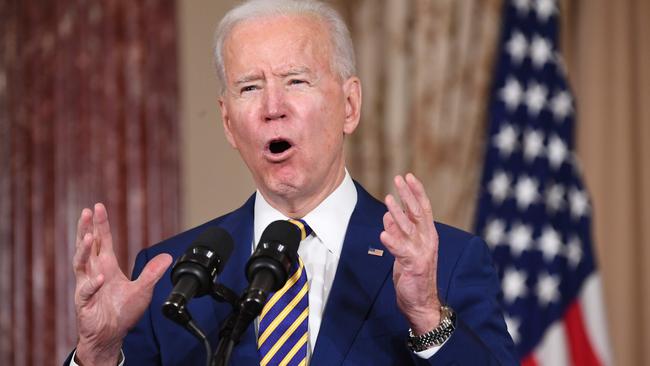
Separately, and very differently, the two world major powers — in this case the US and China — are undergoing fundamental and nation-changing revolutions.
What is happening in China as it moves from being a Western-friendly and increasingly open administration to a dictatorship has been well documented.
What is happening in the US is no less dramatic but has been obscured by the local US media as they concentrate on the impeachment of former president Donald Trump and the COVID-19 pandemic.
As we have seen many times, the investment people who are the most skilled at recognising fundamental changes in a community are often bond investors. Too many sharemarket analysts are enmeshed in short-term announcements.
In recent years I have had many conversations with Christine Todd, who is the Boston-based US fixed-income head for Amundi, Europe’s largest investment manager.
She always adds a new dimension to what is happening in the US, so with President Joe Biden now settled in office, this week I scheduled another US discussion with her.
I discovered that the changes looming in the US are far more profound than I ever imagined and so I will write a two-part series. The first will detail some of the major changes and then part two will look at what those changes might mean for the marketplaces and global communities.
Here are the top 10 Todd-Gottliebsen forces in the 2021 US revolution:
• US consumers have some $US2 trillion ($2.6 trillion) in spare cash that they are holding back. Much of it came from government aid programs. But the distribution of that spare cash is not even with blacks, Hispanics, Latinos and many women who among those that missed out. There is a huge prosperity divide.
• Lower interest rates and quantitative easing greatly expand this inequality because they push up the value of property and shares that are owned by the better-off people. Lower-income people miss out.
• Biden has vowed to substantially reduce income inequality, but his plans to achieve this are radical. The linchpin is to more than double the minimum wage from $US7.25 an hour to $US15. Biden doesn’t have the power to make that determination across the board, but it will be paid to government workers including those who work on infrastructure projects such as roads and bridges.
It will quickly spread through the nation and those enterprises who are big employers of unskilled labour will see big cost rises and will scramble to automate and/or raise their prices.
• A series of wealth taxes is proposed, including an extra tax on dividends and capital gains. Exactly how these will work is not known but they will certainly apply to deceased estates and will almost certainly apply to existing assets. The company tax rate will be increased from 21 per cent to between 25 per cent and 27 per cent. The exact rise is not determined.
• In Australia we have seen how, when the COVID-19 threat is substantially reduced, there is a surge in consumer spending. In the US this will be monumental because not only is there a build-up of cash, but vast new injections of cash are proposed. It reminds me of what happened in Australia during the 1970s when Gough Whitlam became prime minister and implemented the spending program he had announced a year or so earlier. But previous prime minister William McMahon, in his short period in office, implemented a similar but different program. The combination of the two over-stimulated the economy and sent inflation into double figures, helped by a sharp oil price jump. The earlier Trump stimulation not only involved large cash injections but he accelerated the development of a vaccine, which in 2021-22 will be an economic stimulant.
• Even before the Biden stimulation takes place, US sources of skilled labour are drying up and shortages are emerging around the country. The supply chain is having difficulty supplying requirements for industries like car manufacturing. Biden is trying to ease the shortages by importing skilled labour, but it is a slow process.
• The cocktail of skilled labour and material shortages, a high minimum wage and ballooning demand is getting extra impetus from a rise in the influence of the dormant US union movement, which is likely to accelerate in the next two years because it is encouraged by Biden.
• Biden is not blocking the European attempts to impose taxes on booming US technology giants like Google (Alphabet), Microsoft, Facebook, eBay, Netflix and so on. The US may introduce its own taxes. This is likely to trigger a global move to ensure the technology giants pay tax in the countries in which they operate, including the US.
• In Europe they are attempting to achieve their green objectives by regulation. Biden is taking a different course and has allowed institutions to use carbon reduction and green investment as an investment criteria. This was banned by the Trump administration. In effect, the US will aim to achieve its carbon reduction targets mainly via the capital market rather than regulation.
• The greening of America will require a vast amount of investment so is likely to multiply the demand for conventional resources including oil, gas and coal. In other words there will be heavy carbon usage to replace carbon, which will inflate the prices. The emerging capital clamps on bank and other investment in carbon resources that we are seeing in Australia illustrates the dangers of a demand supply squeeze.
Tomorrow: How this revolution will affect the US and the world.








We are experiencing a peacetime event rare in world history.